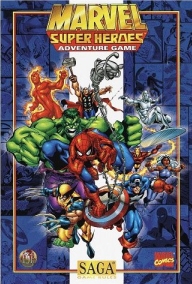Contents
The game box contained a Fate Deck, roster book, and instruction manual.
Fate Deck
The Fate Deck was a deck of 96 cards used instead of dice in order to determine the outcome of actions and to help determine results. Each card contained a picture of a character, a Calling, an Aura (positive, neutral, or negative), and a Suit.
There were five Suits, each of which represented by a character. The Suits were:
TSR issued four promotional cards separately at the launch of the game: Ghost Rider, Lockheed, Deadpool and The Impossible Man. These cards are quite rare today. [3]
Roster Book
The roster book contained the game details and biographies of 31 Heroes and 19 Villains.
The Game Book
The game book was an instruction manual that guided players in how to play the game and create their own characters.
Game rules
The game rules were designed for fast and simple play. Each character had 4 abilities, rated from 1 to 30. Normal human abilities ranked between 1 and 10; superhuman abilities, such as Thor's strength, ranged between 11 and 20; cosmic-level characters, such as Galactus, could have abilities between 21 and 30. Each character also had an Edge, ranked between 0 and 5, which was to represent their experience as a hero or villain. The character's Edge determined the player's Hand Size (2 plus the Edge value). Supporting characters and minions typically had an Edge of 0; Inexperienced characters, hero such as Jubilee of the X-Men, had an Edge of 1; Experienced heroes, such as Hawkeye, had an Edge of 2; Expert characters, such as Iron Man, held an Edge of 3; Characters that were the very best at what they did, such as Captain America, had an Edge of 4; cosmic-level characters, such as the Watcher, had an Edge of 5.
Characters also had 111 Powers, further customized by Stunts (additional abilities) and Limits (limitations of the power). There were 100 Skills to choose from, each of which had one of the Ability Suits as its Trump Suit.
This page is based on this
Wikipedia article Text is available under the
CC BY-SA 4.0 license; additional terms may apply.
Images, videos and audio are available under their respective licenses.
